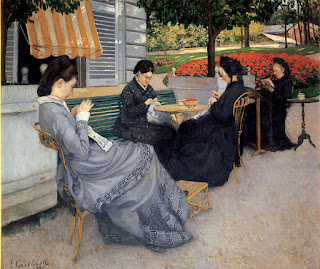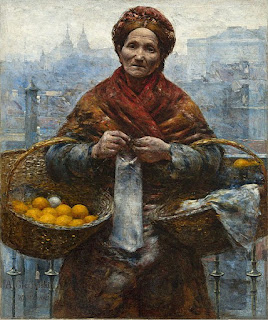Planning to Improve the Planet - Part Five
And much truth is a mystery.
How do you usually assess abilities, and why do you take that approach?
How do you usually assess knowledge and biases and usefulness and dangers?
What do you know about currency and fluency and how have you acquired that knowledge?
How do you assess the current and the relevant in various situations, and why?
What do you know about knitters and trinkets?How do you usually reflect on the meaning of completion?
How do you reflect upon the meaning of healing?
How do you reflect upon the meaning of wealth?
If you enjoy knitting, how would you feel if someone gave you a thousand items of completed knitwear or a thousand balls of wool or a thousand sheep or a spinning wheel and a thousand fleeces?
What would such 'gifts' do to your feeling of enjoyment?
Perhaps you mainly use your skills, whether in knitting or another ability, towards earning money and/or acting charitably, rather than mainly for your personal enjoyment and/or desire to avoid boredom.
Perhaps you regard the giving of 'gifts' as a charitable act, regardless of whether you have made the 'gifts' yourself or purchased them ready made.But how well have you thought about the consequences for the recipient?
And how well have you thought about the people, and other creatures, directly and indirectly involved in and/or affected by the supply chain?
How do you know when the giving of 'gifts' is a problem?
Knitting often follows a pattern or set of instructions, whether orally provided or in written and/or diagrammatic form.What do you know about knitting patterns?
What do you know about sewing patterns?
What do you know about patterns of teaching?
What do you know about patterns in nature?
What do you know about design patterns?
What is your preference when selecting between patterns for a particular purpose?
How patterned is your thinking, and why?
What do you know about the formation of patterns?What do you know about DNA repair?
What do you know about architectural pattern books?
What do you know about patterns in juggling?
Perhaps you enjoy juggling balls of wool.
You may or may not associate knitting and/or juggling with planning to improve the planet.
Yet a pattern is a type of plan. Whether it is suitable in a particular context is another matter entirely.
What do you know about knitted caps, beanies, and various types of wearable bonnets?What do you know about homeostasis and the science of healing?
What do you know about casting on and binding off a piece of knitting?
What do you know about casting as a manufacturing process and the associated patterns?
What do you know about pattern coins and numismatics?
What do you know about currency as a medium of exchange?
What do you know about the currency used by wonderful witches?
What do you know about the thread of life and its uses?What do you know about coins as charms in various cultures?
What do you know about the etymology of the words cast and casting, and their various meanings?
How have you been comparing one image here with another and another and another and another and another and another?
What do you know about visual thinking and visual language?
What do you know about visual perception and visual processing?
What do you know about the various meanings of the word token, and how did you acquire an understanding of those meanings?Perhaps you know something about gift tokens and token gifts.
You may know something about gift cards or various vouchers.
What do you know about the Golden Fleece?
Who has been spinning your destiny, besides Clotho?
Who and what will influence your decisions before Atropos makes her decision about you?
And what do you know about the decisions of Lachesis in relation to your life?
Perhaps you have difficulty distinguishing between literal and figurative meanings, at least in some situations.How have you assessed your language fluency, and in which contexts?
How have you attempted to knit your life together?
When have you felt you life has been unravelling?
What do you know about visual capture and multisensory integration?What have you been learning about wonderful witches?
Wonderful witches overcome any phobias they have acquired. They also overcome any superstitions and biases they have possessed.
Which phobias have you acquired, and why, and how have you attempted to overcome them?Which sources of distress have you been unable to overcome, and why?
What have been your methods for overcoming superstitions and biases in your own mind?
- Protecting Health Properly and Helping Healing Adequately
- A Clique of Rich Friends
- Not a Commonplace Book
- The Enlightened Re-enchantment of the World - Part Four
If you are planning to improve the planet, has anyone told you to stick to your knitting or sewing or poetry readings or music or bonnet decorating or flower arranging or cake making or household management and housekeeping more generally?
Being clear about your own intentions requires a good plan.
Being clear about other people's intentions helps to inform good plans appropriately.You may associate wealth with dominance.
You may regard displays of wealth as dominance signals, even when at least part of the wealth is displayed in the form of gifts, whether wanted or unwanted.
What do you know about interpersonal, local, national, organisational and geopolitical dominance hierarchies?
What do you know about the Visual Dominance Ratio in various social, political and economic contexts?What is your acquaintance with critical thinking, mental chronometry and motor imagery?
What do you know about counting stitches, whether in knitting or counted-threat embroidery?
The stitch is the fundamental element in many textile arts.
What do you know about knitting stitches?
What do you know about precision teaching?
What do you know about self-help and self-healing?
What do you know about the Colavita visual dominance effect?If you have vision-related biases, particularly in relation to attention, how have you attempted to overcome them?
How is your attentiveness related to your cognitive biases?
What have been your experiences of speech dysfluency?
How have you most recently been comparing one image here with another and another and another and another and another and another?
What do you know about creative problem-solving?
What do you know about other approaches to solving problems?
What do you know about the healing power of nature?
What is your awareness of the type-token distinction?
What is your acquaintance with spatial contextual awareness, spatial memory, and spatial ability?
What do you know about ultracrepidarianism, and how do you know it?
How do you distinguish between knowledge and creativity?
How do you distinguish between making, doing, being, having, learning, earning, buying, planning, deceiving and creating?
- Sacred Mysteries
- Witchcraft is Not a Crime
- Addressing the Grotesque
- The Enlightened Re-enchantment of the World - Part Five
- Algorithms and Ambiguity
- Authentic Explorations
- Exposing Charlatans Appropriately - Part Two
What do you know about blind love, and how do you know it?
What do you regard as lovely, and why?
Many people are apparently incapable of understanding the real meaning of friendship. They mistake power for love. They mistake superficial cheerfulness for trustworthiness. They mistake advice for care.
If you are a relatively enlightened being, you will consider your visits to Frugality Cottage to be suitable investments of time in the exploration and development of lovely opportunities.
You will already be making adequate investments in peace, appropriate investments in freedom and suitable investments in simplicity.How do you distinguish between reputable management and disreputable management?
Maybe you are seeking love, in one form or another.
What do you know about investing in useful studies, and how have you acquired that knowledge?
Every attempt to experience simple living, and beautiful love, requires adequately accurate information, and adequate time.
Perhaps you would rather not live simply.
Perhaps you would rather not express love beautifully.
Perhaps you would rather not seek adequately accurate information.
Perhaps you would rather not manage your time sufficiently well.How have you responded to the policies and practices contributing to your past and present experiences of suffering and/or to the suffering of
people you love?
How do you know you have enough time to enjoy their company properly?
How lovingly and frequently do you prepare deliciously healthy meals?
How often do you personally harvest ingredients for those meals?
What do you know about investing in quality of life, and how are you continuing to develop that knowledge?
What do you love to learn, and why?What do you learn through love, and how?
For how long have you been investing in advanced decision-making practices?
What, if anything, have you done to improve the financial literacy of confused individuals?
Where have you been investing in improving political practices, and how long have you been doing so, and how effectively?
Where have you been investing in improved constitutions, and how long have you been doing so, and how effectively?
What do you know about tokenism?
You have now had again had the chance to compare a particular image is another and another and another and another and another and another and another.Perhaps you do not (yet) associate Frugality Cottage with the art and science of improvement, regardless of your awareness of history.
Perhaps you do not want anything to remind you of the past, or the parts of the past you find most distressing.
Perhaps you like to take your mind away from thinking about things that worry you.
But there is no reasonable reason for worrying about the past.
There are only reasonable reasons for improving the immediate future.Only by improving the immediate future can the long-term future be an improvement on the past.
How do you define a possible improvement and act to put it into practice?
Perhaps you are highly ignorant of history.
Perhaps you are at least a little arrogant about your acquisition of knowledge, popularity and/or mentors.
When do you think about investments entirely from your own point of view?
How, if at all, do you use your patronage of particular businesses and other organisations to improve the world?
You have probably already explored various possibilities in Frugality Cottage, including the possibility of improving your skills in several crafts, arts and practical hobbies.
Do you usually regard good leadership to be a practical hobby?
How do you think Frugality Cottage could be improved, and by whom, and with what resources, and for what purpose(s)?
Over the next few months, how do you intend to improve your already
well-informed kindness, your thoughtful reciprocity, your enlightened
understanding, your reasonable hope, your sensible curiosity, and your
compassionate creativity?
Your guide in Frugality Cottage is devoted to improving your knowledge and awareness, and possibly even your manners.


























Comments
Post a Comment